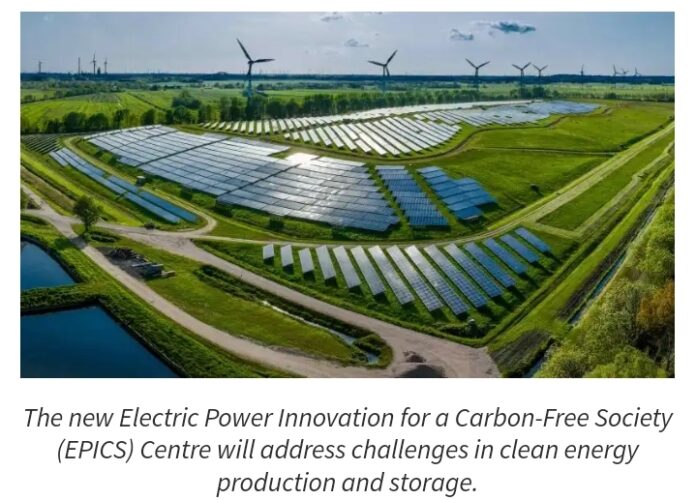The new Electric Power Innovation for a Carbon-Free Society (EPICS) Centre will address challenges in clean energy production and storage.
The University of Melbourne will co-lead the Australian arm of a new research centre, which will fast-track the development of a completely renewable energy power grid – a major hurdle in decarbonising the energy sector – and help to dramatically reduce global carbon emissions.
Announced today, the Electric Power Innovation for a Carbon-Free Society (EPICS) Centre will address challenges in clean energy production and storage through innovation and collaboration with world leaders in clean energy research, technology transfer and policy development.
EPICS will be funded through the National Science Foundation Global Centres in Climate Change and Clean Energy (NSF Global Centres) program and will involve collaboration between Australia, the USA and the UK, who have pledged a multi-million dollar investment over five years to tackle challenges posed by climate change as the world moves towards net zero. EPICS is one of the only two NSF Global Centres involving Australia announced today.
The Australian arm of the EPICS Global Centre will be formally led by CSIRO and the Australian Energy Market Operator (AEMO). The University of Melbourne will be EPICS’ Australian technical lead, through Professor Pierluigi Mancarella, University of Melbourne Chair of Electrical Power Systems and the Australian EPICS Centre Principal Investigator. Monash University completes the Australian team.
University of Melbourne Acting Deputy Vice-Chancellor (Research) Professor Mark Hargreaves said he is delighted the University will be the technical lead of this initiative.
“As a globally connected research institution, the University of Melbourne is deeply committed to addressing the critical challenges of worldwide sustainability in a changing climate,” Professor Hargreaves said.
“Our researchers are ideally positioned to help accelerate the energy transition towards net zero through multidisciplinary expertise, innovation and collaboration – putting the world’s best minds together to solve some of these hitherto intractable problems.”
Professor Mancarella said the global electric power sector is responsible for 42 per cent of global carbon emissions. Yet, several challenges are preventing the development of renewable energy power grids at large scale, which could dramatically reduce these emissions.
“The transition towards a 100 per cent renewable energy power grid is necessary to decarbonise the global electric power sector and support climate-critical decarbonisation of other economic sectors and end users such as transport, heating/cooling, industry and many other domains,” Professor Mancarella said.
“This Global Centre will leverage transformative computing, economic strategies, engineering solutions and forward-thinking policy to help achieve the changes that are needed in an ambitious timeframe.
“EPICS is an unprecedented opportunity to partner with major international institutes in the US and UK, and harness world-leading research to address some of the most pressing scientific challenges that Australia and other jurisdictions worldwide are facing during the energy transition towards net zero.
“These challenges range from guaranteeing stable and secure system operation in the presence of ultra-high penetration of renewables and distributed energy resources to identifying robust and resilient investment paths to decarbonise the whole energy system.”
As well as academic leaders in the USA, UK and Australia, the Centre has partnered with global industry leaders in technology transfer and policy development: The Global Power System Transformation Consortium, Energy Systems Integration Group, and the Future Power Forum Market.
These partners have committed their resources to support EPICS’ implementation agenda, including translation of research discoveries into practice, stakeholder engagement, education and workforce development and public outreach.














